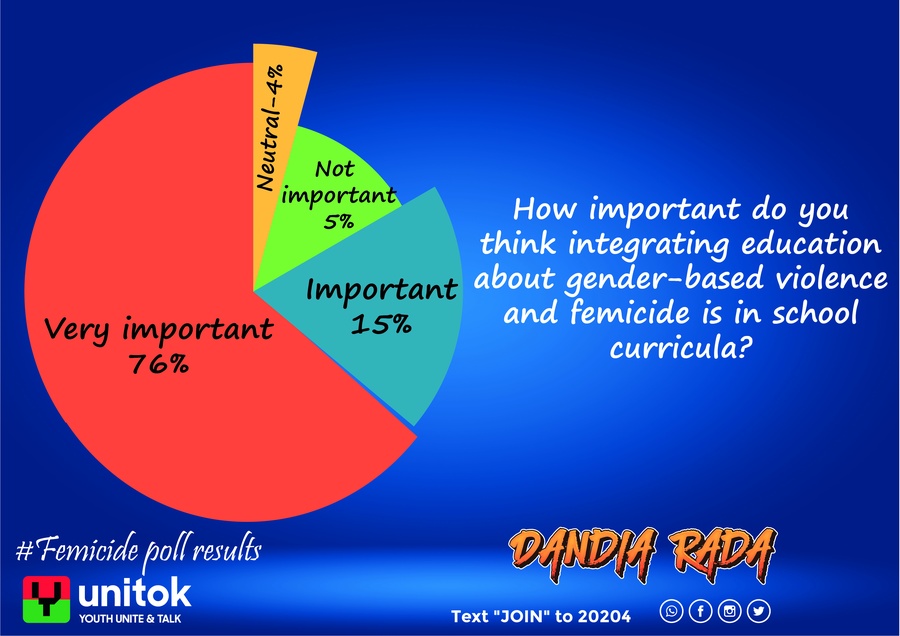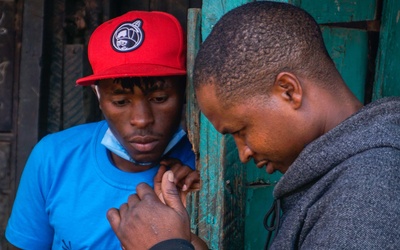The Shadow of Femicide in Kenya:
Across the globe, the chilling reality of femicide - the intentional killing of women based solely on their gender - paints a grim picture. Kenya, unfortunately, is not immune to this devastating issue. Rooted in harmful social norms and fuelled by power imbalances, femicide continues to threaten the safety and well-being of women and girls. Recognizing the urgency of this crisis, Yunitok embarked on a comprehensive poll to gather vital insights into Kenyan youths awareness and perceptions of femicide.
Understanding the Issue:
Femicide represents the most extreme form of violence against women and girls, deeply embedded in systems that perpetuate inequality and discrimination. In Kenya, women and girls face diverse forms of gender-based violence (GBV), from domestic abuse to targeted killings, highlighting the desperate need for effective interventions and prevention strategies. The alarming statistics paint a chilling picture: globally, women and girls fall victim to femicide with shocking frequency, often at the hands of those closest to them.
Unveiling the Yunitok Poll Findings:
Diverse Voices, United Concern:
The Yunitok poll had over 10,000 respondents, painting a diverse picture of Kenyan perspectives. Remarkably, the gender distribution almost mirrored the national population, with female respondents accounting for 50.53% and male respondents representing 49.47%. This balanced representation ensures the insights capture a spectrum of viewpoints within Kenyan society.
The Roots of Femicide:
When asked about the primary drivers of femicide in Kenya, respondents offered thought-provoking insights. A staggering 55% attributed the phenomenon to the influence of social media, highlighting the profound impact of digital platforms on shaping societal attitudes and behaviours, potentially exacerbating GBV. Domestic violence emerged as another significant factor, with 20% of respondents underlining the need for targeted interventions within households. Additionally, 15% cited the lack of legal protection as a critical issue, revealing gaps in enforcing laws designed to safeguard women's rights. Finally, 20% identified harmful social norms and gender stereotypes as key drivers, emphasizing the crucial role of transformative efforts to challenge deeply ingrained beliefs and attitudes.
Building Awareness, Building Hope:
An overwhelming 81% of respondents expressed firm belief in the effectiveness of raising public awareness through programs as a means to prevent femicide. This widespread recognition points to the value of education and advocacy in fostering societal change and promoting gender equality. This resounding endorsement of awareness initiatives underscores the potential of collective action to tackle femicide and its underlying causes.
Navigating the Support System Landscape:
The poll revealed diverse perspectives on public confidence in existing support systems for GBV survivors in Kenya. While 45% of respondents expressed high confidence, a significant 22% indicated a lack of faith in their effectiveness. This highlights the importance of continuous evaluation and improvement of support services to ensure they meet the diverse needs of survivors and facilitate their access to justice and healing.
Education: A Pathway to Change:
The poll findings emphasized the critical role of education in addressing femicide and promoting gender equality. A staggering 76% of respondents stressed the importance of integrating education about GBV and femicide into school curricula. This reflects a recognition of the pivotal role education plays in shaping attitudes and behaviours from a young age, laying the foundation for future generations to challenge harmful norms and contribute to a more equitable society.
The Road Ahead:
The Yunitok poll acts as a valuable tool for understanding femicide awareness and perceptions among Kenyan citizens. By shedding light on the multifaceted nature of the issue and capturing diverse perspectives, the poll findings offer a roadmap for targeted interventions aimed at preventing femicide and promoting gender equality. Moving forward, it is crucial to translate these insights into action, fostering collaboration between stakeholders and leveraging collective efforts to address the root causes of femicide and create a safer, more equitable future for all.
Everyone has a role to play in creating a safer future. Share your unique voice and contribute to this crucial conversation.

















































































































